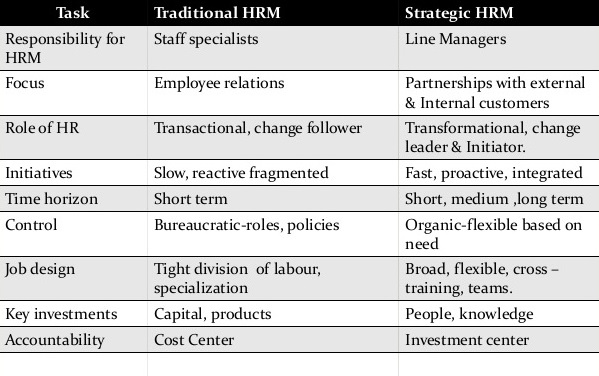Strategic Human Resource Management (SHRM) and conventional HRM may seem similar at first glance, as both focus on managing employees to enhance productivity. However, they differ significantly in approach, scope, and methods.
1. Focus and Specialization
SHRM primarily deals with managing employees within an organization. In traditional HRM, the same personnel often handle multiple HR functions—such as recruitment, training, and performance appraisal. In contrast, Strategic HRM involves specialized professionals for distinct areas, ensuring greater expertise and efficiency.
2. Short-Term vs. Long-Term Goals
While both SHRM and Strategic HRM aim to boost employee performance, their focus differs. SHRM often addresses immediate HR needs and operational efficiency. Strategic HRM, on the other hand, emphasizes long-term organizational objectives, designing programs that align with future business goals.
3. Methods and Tools
Conventional HRM relies on basic HR techniques, whereas Strategic HRM employs sophisticated and systematic tools to enhance employee motivation, engagement, and overall productivity. This strategic approach allows organizations to proactively plan for workforce development rather than reacting to immediate issues.
4. Alignment with Organizational Goals
Strategic HRM goes beyond managing employees; it integrates HR strategies with overall company objectives. It emphasizes partnerships with both internal and external stakeholders to achieve business goals. Unlike conventional HRM, which may focus on day-to-day staffing and operational tasks, Strategic HRM ensures that every HR initiative contributes to the broader organizational vision.
5. Job Design and Structure
In SHRM, job roles are implemented according to the strategic plan through HR personnel. Job division tends to be fixed, and HR specialists handle most HR functions. In Strategic HRM, however, job design is flexible, and line managers play a larger role in implementing HR strategies, creating a more dynamic and responsive organizational structure.
Strategic HRM versus Conventional HRM

Conclusion
While SHRM and conventional HRM both aim to optimize employee performance, Strategic HRM takes a broader, more integrated approach. By aligning HR practices with long-term business objectives, using specialized expertise, and employing systematic tools, Strategic HRM ensures that human resources become a true strategic partner in organizational success.







